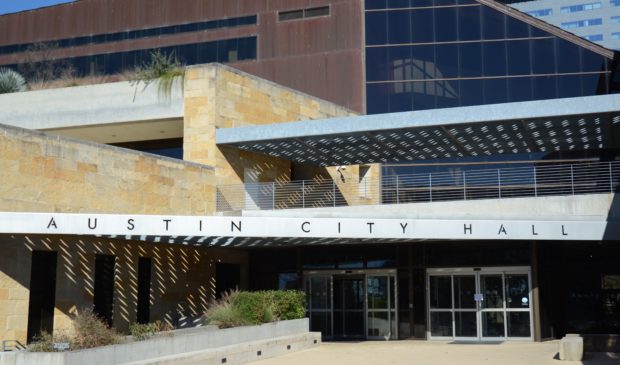Lower public safety bill cuts tax growth
Monday, August 6, 2018 by
Jo Clifton Austin taxpayers will catch a break from the typical sharp escalation of city taxes, utility bills and other fees, so that the owner of a median priced home of $332,366 will pay only about $78 more in 2019 than they paid this year. That’s if City Council sticks to the budget numbers proposed by City Manager Spencer Cronk at a budget briefing this afternoon.
Cronk has the good fortune of presenting his first proposed budget to Council this afternoon in a rare year – one in which the city is saving money because two public safety labor contracts (police and emergency medical services) have lapsed, and one in which health insurance contracts have not increased.
Those are the major reasons the city will be able to fill 15 new sworn police officer positions and 12 previously unfunded sworn positions as well as transfer an additional $3.1 million to the city’s Housing Trust Fund, Deputy Chief Financial Officer Ed Van Eenoo said in a media briefing Monday morning.
In embargoed comments released to the media prior to this afternoon’s speech, Cronk said, “Public safety is the largest component of our General Fund budget. This year, we’ve added funding for 33 new police officers. Twelve of those were added to the budget previously, but not funded. We’ve also increased the staffing for victim services. While this satisfies some of the immediate needs around community policing, it’s critical that we secure a labor agreement before we make decisions about future staffing levels and how they may impact the budget.”
Van Eenoo declined to discuss what funding staff had projected for public safety employees, but pointed out that firefighters reached agreement with city negotiators for a 0.25 percent pay hike the first year of their contract and 0.5 percent the second year. He noted that firefighters were already being paid an above-average wage. The city proposes to add 68 new firefighters and expedite construction for new stations in Moore’s Crossing and Travis Country. In addition, the city plans to open the Onion Creek Fire/EMS station in FY 2019.
Staff is proposing a 4.9 percent increase in the property tax, not close to the 8 percent rollback rate Council has approached in the last several years, van Eenoo noted. “That’s the second-lowest (increase) it’s been since 2010-2011,” he said.
The tax on the median priced home will increase just $61.48, thanks in part to an increase in the homestead exemption from 8 percent to 10 percent adopted by Council in June. For homeowners age 65 and older or handicapped that increase will be even smaller, Van Eenoo explained.
City civilian employees will receive a 2.5 percent across-the-board increase at a cost of $18.5 million citywide. The city will expedite its commitment to increasing the wages of its lowest-paid employees. Van Eenoo said that lowest wage would increase from $13.84 per hour to $15 per hour, achieving a Council goal one year early. That wage increase applies to both full-time and part-time employees, he said. In addition, neither employees nor retirees will face an increase in their health insurance premiums, he said.
While Austin’s growth, about 30,000 new citizens each year, adds to the need for new spending, the city also benefits from growth in taxable properties. According to a city spokesman, as of the tax year 2018 certification for all entities, annexations were valued at $636 million and new construction at $3.15 billion for a total new property value of $3.8 billion.
Austin Energy is not raising its rates but electric ratepayers may see a small annual increase in fuel charges, estimated to be $2.76 annually. Austin Water, on the other hand, is projecting that the average customer will pay $1.44 less in the coming year than they are paying this year. The drainage utility fee, the clean community fee and charges for trash and recycling pickup will remain the same, but the transportation user fee will increase by a little more than $15 in the coming year.
Addressing Council, Cronk noted that the Strategic Housing Blueprint they adopted last year “is a key driver for our investments in housing. That includes additional efforts to streamline the development review process and assist potential applicants in navigating incentive programs.”
He noted that the budget proposes that the Neighborhood Housing and Community Development department spend $40 million, “and I’m proud to say that we are fully funding the Housing Trust Fund.” In line with requests from Council for more funding to aid the homeless, staff is also proposing $3.1 million in new funding for those programs, including $1 million and five positions to enhance the homelessness outreach street team in a $1 million contract for homeless camp cleanups citywide.
Cronk said in his prepared remarks, “When I took this job, one of the commitments I made was to make the budget process more focused, streamlined and consistent with your priorities as a Council and reflective of the priorities of our community.”
The Austin Monitor asked Van Eenoo whether he could break down city expenditures by Council district, for example District 1. Taking Austin Energy as an example, he replied, “Electrons don’t work that way and that’s the biggest part of our budget.”
Photo by John Flynn.
The Austin Monitor’s work is made possible by donations from the community. Though our reporting covers donors from time to time, we are careful to keep business and editorial efforts separate while maintaining transparency. A complete list of donors is available here, and our code of ethics is explained here.
You're a community leader
And we’re honored you look to us for serious, in-depth news. You know a strong community needs local and dedicated watchdog reporting. We’re here for you and that won’t change. Now will you take the powerful next step and support our nonprofit news organization?










